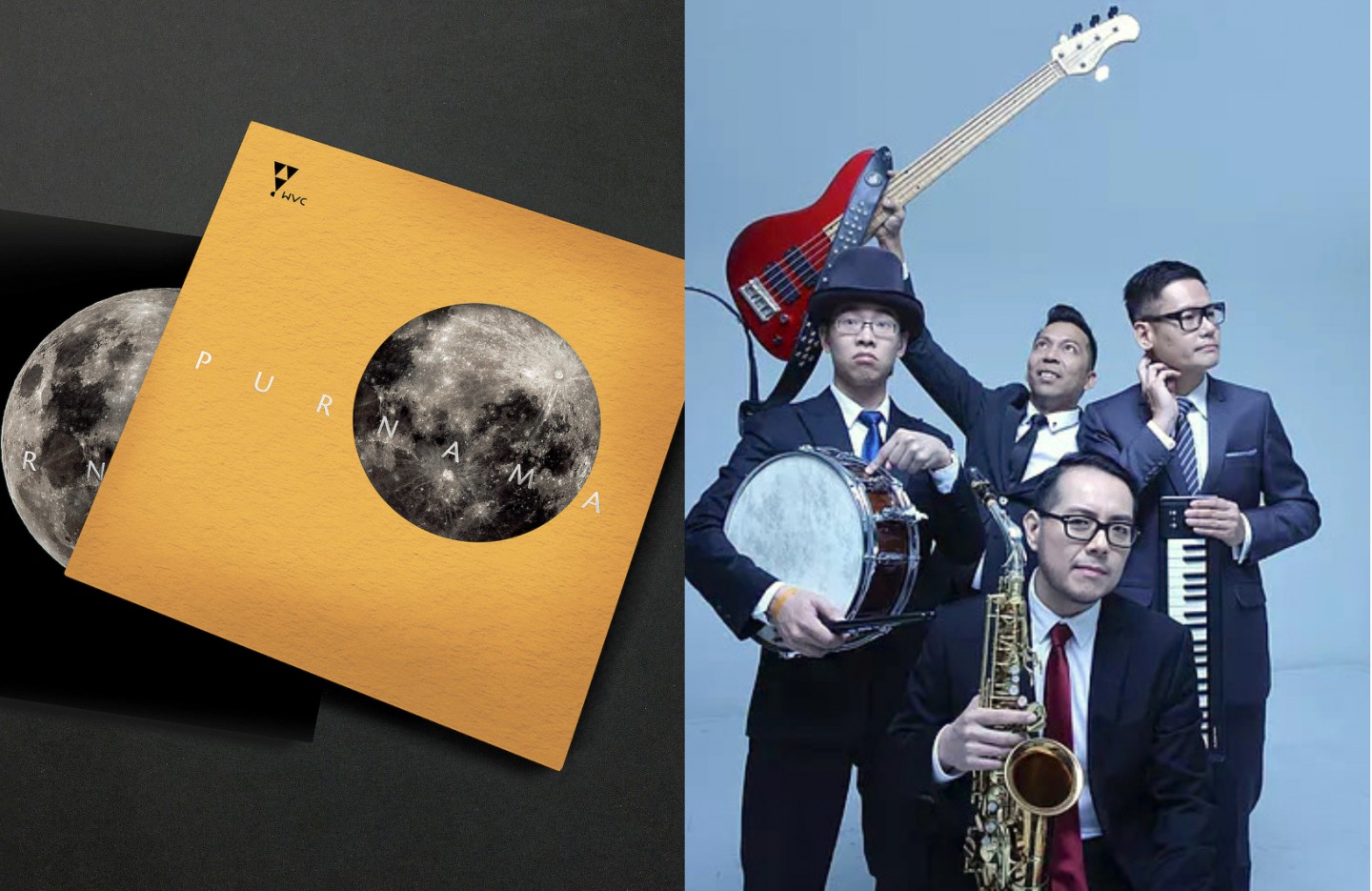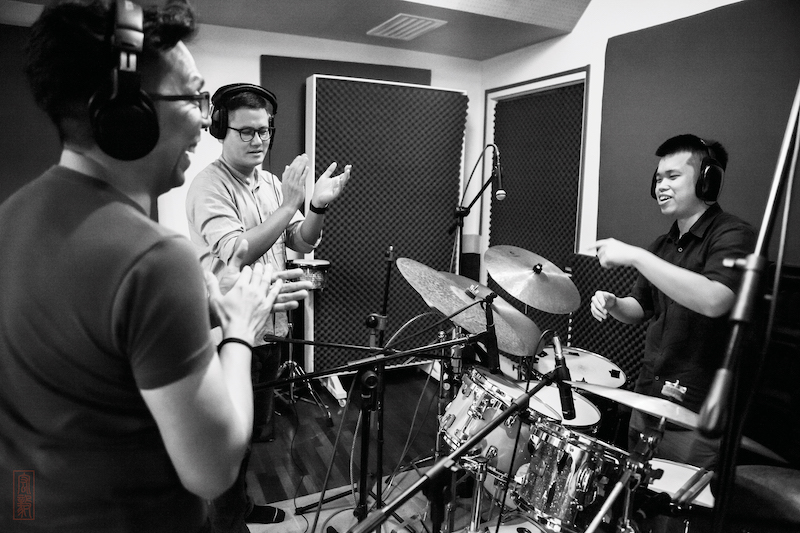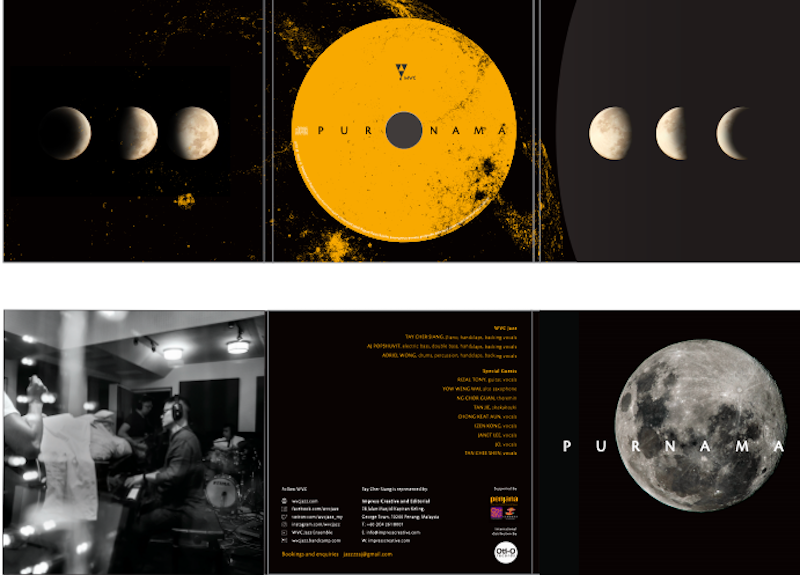
On a personal level, Purnama is the fruit of frontman Tay Cher Siang's search for music born in this tanah tumpah darahku (land of my blood) that he missed (Photos: WVC Jazz Ensemble)
Rock and its image of angry youth throwing stones or raising a middle finger to the establishment used to get young Tay Cher Siang all riled up. He loved what the shout-it-out-loud music stood for, and stories of Woodstock and the first elected Czech president being a former rocker made him go “Wow!”
But pianist, composer and arranger Tay, who encountered jazz by chance and was enticed by its rhythm and has spent almost two decades learning its language, now feels jazz is perhaps even more powerful than rock. “It’s a very undercurrent, very quiet kind of thing. In a way, jazz is really a democracy because it’s about everybody listening to everybody.”
The frontman of WVC Jazz Ensemble, which released its seventh album, Purnama, on June 30, explains: “I may compose or arrange a piece, but if a fellow musician comes up with something interesting while we are playing, I have to stand down and follow him and see where it leads us. We serve the music.”
Serving the music happens often in jazz, and a song may take off in unexpected directions, unlike classical works, where musicians follow what the composer has set on paper. What’s more, it can lead to a place that is better for the music, as happened when WVC invited Malaysian musicians Rizal Tony (on the guitar), Yow Weng Wai (saxophone), Ng Chor Guan (theremin) and Tan Jie (shakuhachi) to work on Purnama, together with singers Janet Lee, Jo, Izen Kong, Chong Keat Aun and Tan Chee Shen.
Tay, 43, says having collaborators on the album forced him and fellow band members — bassist AJ PopShuvit and drummer Adriel Wong — to think differently, resulting in a freshness to their playing. “They brought their understanding of what I was trying to do and contributed their vision of what this music should sound like. There was a lot of give and take.”
Delightful turns aside, there is no missing the political connotations in his work. “When my generation was growing up, Vision 2020 was the dream for the country. But when we reached 2020, it was a whole anti-climax — where were the flying cars, the so-called first world? In a way, the album sort of questions: What have we been doing these last 30 years?”
20210309-wvc-purnama-recording47_51113433319_o.jpg

On a personal level, Purnama is the fruit of his search for music born in this tanah tumpah darahku (land of my blood) that he missed, growing up in a Chinese environment and isolated from other cultures. Tay is embarrassed to admit that he used to know way more about musicians from the US or UK than those at home, or the country’s music.
“A lot of jazz performances use songs that we call jazz standards, basically oldies, as vehicles for improvisation. Nothing wrong with that, but I thought, how about our own songs. Can we use Malaysian music to speak to the world?”
To answer that, he set out in 2016 to learn more about our musical inheritance. Early discoveries led to Seketika Sebelum Merdeka — four concerts featuring Malayan classics “reimagined with WVC flavours”, supplemented by stories, anecdotes and history narrated by Eddin Khoo, who sang the songs with Janet Lee. Guitarist Nazrin Muhammad was part of the 2017 show in Kuala Lumpur, “which was perhaps the catalyst for me to really explore what is an enormously rich musical legacy”, says Tan.
More years of digging led to surprise finds — good materials that could withstand the scrutiny of so-called educated musicians and learned ears. “Purnama is my attempt to repackage the traditional songs with more modern sensibilities and introduce them to a new audience, to look into our musical history and create reimagined versions of Malayan and Malaysian tunes that may or may not be familiar,” Tay says.
On the lineup are Hitam Manis, Lenggang Mak Limah, Ibu, Main Shayar To Nahin, Putera Puteri, Jingli Nona, Tunggu Sekejap, Penang Samba, Hatiku Rindu, Joget Malaysia, Song of Crossing at Dawn and Purnama. Tay chose most of them from a list of 50 pre-Merdeka songs Khoo gave him for Seketika Sebelum Merdeka.
He decided to put in Joget Malaysia because it features Saloma and P Ramlee singing about the different races living in harmony in the new country. The avid reader had recently finished Tommy Thomas’ memoir, My Story: Justice in the Wilderness, and he thought of linking the idea of the Malaysian dream and what has happened since, but also remind people that all is not lost and we have to keep fighting.
screenshot_2021-08-03_at_3.45.29_pm.png

Purnama takes its title from the Malay word for full moon. “The moon is timeless, yet we use its phases to compute and comprehend time, and to mark change and symbolise the repetitive cycles of the world,” Tay writes in its liner notes. He quotes Haruki Murakami, who said, “the moon had been observing the earth close-up longer than anyone”, measuring the alternations of birth and death, of creation and decay.
“I read him since I was 13 and he has been a big influence in my career. He talks a lot about music, particularly jazz, and that piqued my interest to find out more. We actually did a few concerts called Murakami and Jazz, where a narrator read passages from his books, and we played music in response to that.”
Tay’s journey back to old songs has been more enlightening than nostalgic. “I understand there were some mistakes along the way, but our forefathers did their best. They were honest and conscientious and stayed put and built the country.
“The language [of the songs] was beautiful, the sentiments hopeful, and the melodies grew out of the rich soil of this land. And the image of a new moon seemed somehow to capture the spirit of those times, for Malaysia’s national anthem, Negaraku, shares its melody with a gorgeous love song made popular in the 1920s, Terang Bulan, and also with Mamula Moon or Moonlight Song or Moonlight in the Southern Sea. Perhaps these songs, I thought, showed us the glint of light on the new road taken.”
Tay started WVC Trio 17 years ago with two Americans while studying jazz pedagogy at West Virginia University in the US. The acronym stands for West Virginia Connection and, for several years after he graduated and returned to Malaysia, the pair would come over to perform during their holidays. “We toured Malaysia and China and came out with our first album in 2007.”
Eventually, both his bandmates settled into life in the West, and Tay decided to bring Malaysian musicians into WVC. “I wanted to keep the name, so I now jokingly call this a ‘We are Very Chun’ band.”
The group is certainly chun (cool): It backed up Chinese jazz artiste Jasmine Chen in a scene in the 2018 rom-com, Crazy Rich Asians. For Tay, that was a one-off fun gig, although he is still amazed how many people could recognise the three musicians in those fleeting seconds of the movie. “It’s a good thing to have on our bio but it has not led to anything.”
Is there a big-enough audience for jazz, especially in Malaysia? “I cannot deny that jazz is a very urbane, if you want to call it, elitist kind of music. But after years of doing it, I find that, for musicians, jazz is a very good tool with which to make any kind of music we want. It is a kind of knowledge, a kind of taste.”
Melaka-born Tay, who started learning the piano when he was seven and hated practising, had his first taste of jazz at 15. While passing an old record shop one day, he heard some music that amazed him.
“I didn’t understand the language — it was sung in Portuguese — but the rhythm was very enticing and appealed to me. I went in and asked what they were playing. The aunty showed me the album and I said, ‘Keep this for me. I’ll try to save money and come back to buy it.’ From there, I decided that if I could play this music for the rest of my life, I would be happy. That was the spark that got me into learning more about jazz and Brazilian music.”
Do people need to know the “language” of jazz to enjoy it?
“Not really,” Tay says. “Laymen don’t need to have musical knowledge to enjoy music. If you kind of feel it, then move your butt lah, swing with us.”
As for its association with an older audience, he adds that, of late, there has been a kind of jazz renaissance. “In the UK and US, jazz has become younger. Lots of musicians have come out with their take on what the music is about. And jazz keeps on changing, all the time.”
Listen to a sample of their latest album here.
This article first appeared on Jul 19, 2021 in The Edge Malaysia.


